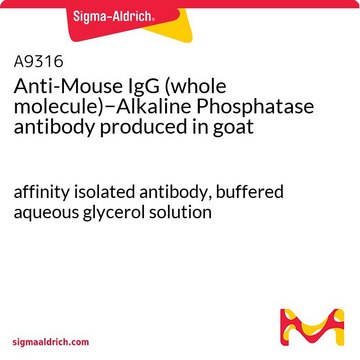D7679
3,3′-Diaminobenzidine (DAB) Liquid Substrate Dropper System
liquid
Autenticatiper visualizzare i prezzi riservati alla tua organizzazione & contrattuali
About This Item
Numero CAS:
Numero CE:
Numero MDL:
Codice UNSPSC:
12352204
ID PubChem:
NACRES:
NA.75
Prodotti consigliati
Forma fisica
liquid
Livello qualitativo
tecniche
immunoblotting: suitable
Solubilità
water: soluble
Condizioni di spedizione
wet ice
Temperatura di conservazione
2-8°C
Stringa SMILE
Cl.Cl.Cl.Cl.Nc1ccc(cc1N)-c2ccc(N)c(N)c2
InChI
1S/C12H14N4.4ClH/c13-9-3-1-7(5-11(9)15)8-2-4-10(14)12(16)6-8;;;;/h1-6H,13-16H2;4*1H
KJDSORYAHBAGPP-UHFFFAOYSA-N
Descrizione generale
DAB (3,3′-Diaminobenzidine Tetrahydrochloride) Liquid Substrate Dropper System has been developed for use in immunohistology and immunoblotting procedures as a precipitating substrate for the detection of peroxidase activity. DAB is the immunohistology substrate of choice because it produces an intense brown stain that is easily observed. The end product is resistant to alcohol, therefore, a variety of counterstains and mounting media can be used with the DAB Liquid Substrate Dropper System. DAB Liquid Substrate Dropper System provides all of the chromogen and buffer/peroxide solutions needed to produce a fast and convenient DAB substrate solution.
Applicazioni
3,3′-Diaminobenzidine (DAB) Liquid Substrate Dropper System has been used as a developer in immunohistogical examination.
Avvertenza
Stable at least one year at 2-8 °C.
Quantità
Each DAB liquid substrate dropper system will provide ten individual application dropper bottles of 10 mL of a fast and convenient DAB substrate solution.
Solo come componenti del kit
N° Catalogo
Descrizione
- 10× DAB Liquid Chromogen 10 mL
- premeasured, ready-to-use buffer/peroxide solution for individual application 10 x 9
Codice della classe di stoccaggio
11 - Combustible Solids
Classe di pericolosità dell'acqua (WGK)
WGK 3
Certificati d'analisi (COA)
Cerca il Certificati d'analisi (COA) digitando il numero di lotto/batch corrispondente. I numeri di lotto o di batch sono stampati sull'etichetta dei prodotti dopo la parola ‘Lotto’ o ‘Batch’.
Possiedi già questo prodotto?
I documenti relativi ai prodotti acquistati recentemente sono disponibili nell’Archivio dei documenti.
I clienti hanno visto anche
N M Chu et al.
The journal of histochemistry and cytochemistry : official journal of the Histochemistry Society, 37(2), 257-263 (1989-02-01)
Immunoblotting techniques are widely used for detection of antigen immobilized on nitrocellulose membranes. There are many immunolabeling methods and staining methods available to disclose the presence of antigen in such techniques. Five common staining methods each for alkaline phosphatase and
CD8+ T cells expressing IL-10 are associated with a favourable prognosis in lung cancer
Miotto D, et al.
Lung Cancer, 69(3), 355-360 (2010)
The duality of beta-catenin function: a requirement in lens morphogenesis and signaling suppression of lens fate in periocular ectoderm
Smith AN, et al.
Developmental Biology, 285(2), 477-489 (2005)
Carola W N Damen et al.
Analytical biochemistry, 393(1), 73-79 (2009-06-16)
For the bioanalysis of therapeutic monoclonal antibodies in biological matrices, immunoassays--especially enzyme-linked immunosorbent assays (ELISAs)--are the most widely used techniques. Although ELISAs are very sensitive, the obtained sensitivity is not always sufficient. In this study, we have investigated the possibilities
S M Hsu et al.
The journal of histochemistry and cytochemistry : official journal of the Histochemistry Society, 30(10), 1079-1082 (1982-10-01)
Three metallic ions, NiCl2, CoCl2, and CuSO4, were found to modify the color of the normally brown diaminobenzidine (DAB) reaction. The colors ranged from purplish blue (NiCl2), dark blue/bluish black (CoCl2), to greyish blue (CuSO4). We have found that the
Il team dei nostri ricercatori vanta grande esperienza in tutte le aree della ricerca quali Life Science, scienza dei materiali, sintesi chimica, cromatografia, discipline analitiche, ecc..
Contatta l'Assistenza Tecnica.








